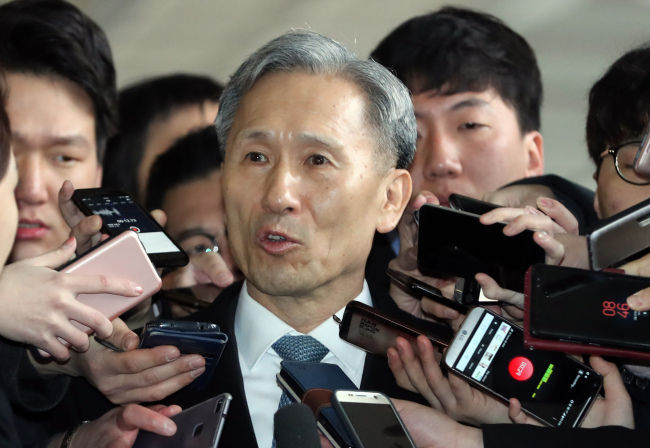Former defense chiefs fall from grace as NK delegates return home
By Yeo Jun-sukPublished : Feb. 27, 2018 - 16:03
After he was promoted to a four-star general in 2005, Kim Kwan-jin hung pictures of the North Korean military leadership in his office -- a practice that continued until Kim became the defense minister in 2010 and presidential security adviser four years later.
The practice earned him popularity among conservatives at a time when cross-border tensions escalated following the North’s sinking of the South Korean Cheonan warship and an artillery strike on the border island of Yeonpyeong.
The decorated general is now under investigation over allegations that he disrupted the military’s internal probe into an election-meddling scandal in 2012 to bring victory to former President Park Geun-hye, under whom Kim served as a top defense and security official.
“I will do my utmost to explain all the controversy,” said Kim, who appeared at the Seoul Central District Prosecutors’ Office on Tuesday. “I’m really saddened to see some of the military investigators behind bars.”
The practice earned him popularity among conservatives at a time when cross-border tensions escalated following the North’s sinking of the South Korean Cheonan warship and an artillery strike on the border island of Yeonpyeong.
The decorated general is now under investigation over allegations that he disrupted the military’s internal probe into an election-meddling scandal in 2012 to bring victory to former President Park Geun-hye, under whom Kim served as a top defense and security official.
“I will do my utmost to explain all the controversy,” said Kim, who appeared at the Seoul Central District Prosecutors’ Office on Tuesday. “I’m really saddened to see some of the military investigators behind bars.”

Kim’s appearance came a day after his predecessor Kim Jang-soo was questioned by prosecutors over his alleged role in fabricating the timeline of initial reports on the sinking of the Sewol ferry to former President Park.
As with his combative successor, Kim Jang-soo also gained popularity due to his hawkish stance against North Korea, which was famously captured during his encounter with the North’s former leader Kim Jong-il when he met with his South Korean counterpart Roh Moo-hyun for a summit in 2007.
Accompanying President Roh, who advocated an engagement policy with Pyongyang, Kim Jang-soo shook hands with Kim Jong-il without bowing to him -- a stark contrast with Seoul’s other high-ranking officials who paid their respects to the North’s leader with deep bows.
Coinciding with North Korea’s former spymaster Kim Yong-chul’s visit to South Korea for the Olympic closing ceremony, the military duo’s fall from grace reflects the changing dynamics of the political landscape here and the ironic political fate they face.
“If they are found guilty, I don’t want to defend what they did,” said a retired Army general who requested anonymity. “But still, it’s so unfortunate to see those fighting against North Korea might go to jail when the government welcomed Kim Yong-chul’s visit.”
Along with his supporting staff, Kim Yong-chul returned to North Korea on Tuesday after wrapping up his three-day visit to South Korea, which included a meeting with President Moon Jae-in when both attended the closing ceremony of the PyeongChang Winter Olympics.
His trip to the south has deepened the political rift between the liberals and conservatives, with the latter accusing Kim of masterminding North Korea’s attacks on the South, including the Cheonan sinking. The Moon administration asserted there is no clear evidence linking Kim to the attack.
Until now, the summoned South Korean defense ministers have both appeared to deny the allegations surrounding them. Kim Jang-soo refuted the allegation that he received specific orders from former President Park to fabricate the initial report on the Sewol sinking.
“How could a president make such an order,” Kim said, responding to reporters’ questions when he appeared at the Seoul Central District Prosecutors’ Office on Monday. “It will all be revealed during the investigation.”
Prosecutors suspect that the former presidential security adviser ordered his staff to alter the presidential office’s daily log to make it appear that Park was briefed about the Sewol sinking 30 minutes later than originally thought.
The allegations have fueled public outrage that Kim Jang-soo helped Park lessen her accountability as a head of state during the Sewol sinking, which claimed the lives of 304 people and eventually dealt a blow to Park’s presidency that ended last year when she was ousted over a massive corruption scandal.
Kim Kwan-jin and Kim Jang-soo both assumed top military positions during the Park administration, its conservative predecessor Lee Myung-bak administration and even during the liberal Roh Moo-hyun administration.
Graduates of the Korea Military Academy, Kim Kwan-jin and Kim Jang-soo held key military positions including the Army’s chief of staff, chairman of the Joint Chiefs of Staff and deputy commander of the Combined Forces Command.
By Yeo Jun-suk (jasonyeo@heraldcorp.com)





![[From the Scene] Monks, Buddhists hail return of remains of Buddhas](http://res.heraldm.com/phpwas/restmb_idxmake.php?idx=644&simg=/content/image/2024/04/19/20240419050617_0.jpg&u=20240419175937)





![[Graphic News] French bulldog most popular breed in US, Maltese most popular in Korea](http://res.heraldm.com/phpwas/restmb_idxmake.php?idx=644&simg=/content/image/2024/04/18/20240418050864_0.gif&u=)


![[From the Scene] Monks, Buddhists hail return of remains of Buddhas](http://res.heraldm.com/phpwas/restmb_idxmake.php?idx=652&simg=/content/image/2024/04/19/20240419050617_0.jpg&u=20240419175937)

![[KH Explains] Hyundai's full hybrid edge to pay off amid slow transition to pure EVs](http://res.heraldm.com/phpwas/restmb_idxmake.php?idx=652&simg=/content/image/2024/04/18/20240418050645_0.jpg&u=20240419100350)

![[Today’s K-pop] Illit drops debut single remix](http://res.heraldm.com/phpwas/restmb_idxmake.php?idx=642&simg=/content/image/2024/04/19/20240419050612_0.jpg&u=)